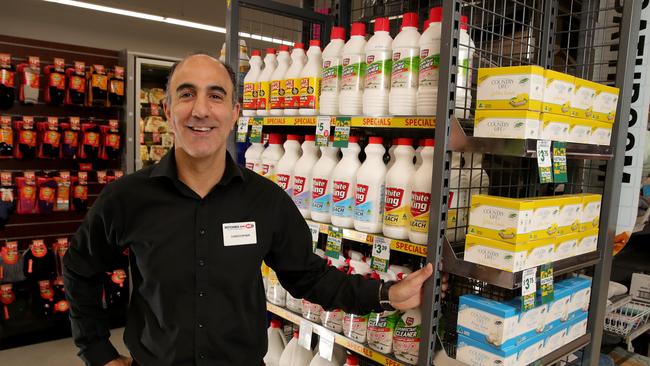Pandemic a boon for smaller grocery chains
Fred Harrison, chief executive of one of the nation’s biggest independent supermarket chains, Ritchies, believes the grocer is enjoying a renaissance.

Fred Harrison, chief executive of one of the nation’s biggest independent supermarket chains, Ritchies, believes the grocer is enjoying a renaissance among shoppers who normally would turn to the majors Woolworths and Coles but are now shopping locally in the wake of the coronavirus pandemic.
Such is the momentum since social distancing, home isolation and other regulations have been imposed in Australia since March that his Ritchies stores have booked like-for-like sales growth of 21 per cent in May, driven by both returning consumers and those discovering the independent chain for the first time.
He believes both the IGA chains of supermarkets and Ritchies have grown market share in recent months, which follows years of fighting hard for every shopper dollar in the brutal price wars between Woolworths and Coles and the incursion of Aldi.
Mr Harrison points to many consumers preferring the convenience and health aspects of shopping at less congested Ritchies stores, as well as the ease of getting in and out of local suburban independent supermarkets, to explain the new-found strength of the sector.
“IGA has grown market share. Ritchies has significantly grown market share.
“I think there has been a big push by the consumer to shop local and at businesses that have been there and established for a long period of time,’’ Mr Harrison said.
Christopher Cincotta, store manager at Ritchies, Carrum Downs in outer Melbourne, agreed on the drivers for a leap in his store’s traffic and sales in the last few months.
“People do love that convenience, getting and and getting out easily, they are coming back to our stores and they havent been in for a while and see we have refurbished, or see the deeper range and they are impressed.’’
Ritchies this year celebrates its 150th birthday.
Mr Harrison said: “I think people are concerned about going out to the big shopping centres and fighting through lots of people when you can park at the front door, run in, not have to spend a lot of time in the store and I think we have much better and deeper ranges than the chains. And if you are eating more at home it’s great to have a lot more choice and variety.”
The growing sales at Ritchies, whose network of 78 stores pulls in about $1.2bn a year in sales, mirror that of other convenience retailers such as 7-Eleven, which are also benefiting from the regulation of movement and social distancing due to the coronavirus pandemic.
“We are a brand that is 150 years old and I have been half joking, half saying, ‘in Ritchies we trust’, as we have been through World War I, World War II, depressions, recessions. We are a business that knows how to handle challenging times.”
Mr Harrison said sales in May were up 21 per cent, with many consumers taking another look at independents as a place to shop.
“I think there are a lot of people who historically have always shopped Coles or Woolworths, thinking ‘that’s what my mum did or grandma did, and I will follow suit’.
“Independents often need a great diversion, something that blows people out of the water and makes them relook at how they shop, and I think COVID-19 has put people back into independent stores for the first time in a long, long time — and people are liking what they see.’’
As part of this push there has also been renewed demand for Australian-made, respected and historic brands, with Ritchies highlighting “Aussie made” in its in-store marketing.
A recent report from consultancy company McKinsey found that while Australian consumers are spending less money overall, grocery and household products are an exception, with the cleaning and hygiene categories popular.
This growth comes down to the fact that Australians are choosing local brands that they know and trust, the McKinsey report suggests.
Charlie McLeish, the chief executive of Pental, a consumer goods manufacturer whose brands include White King bleach, Aim toothpaste and cleaning products such as Country Life, Lux and Pears, said his products were rushing off the shelves at independent chains such as Ritchies.
“During the last few months we have been selling a lot of our brands really well out of independent supermarkets.
“The independents have gone through the roof.
“I have never sold so much White King and Country Life in my life as we have through the independent supermarkets.
“And a lot of people have started shopping locally. I didn’t see it coming. Our sales into Metcash (the wholesaler that supplies independents) more than doubled during March, April, May,’’ Mr McLeish said.








To join the conversation, please log in. Don't have an account? Register
Join the conversation, you are commenting as Logout